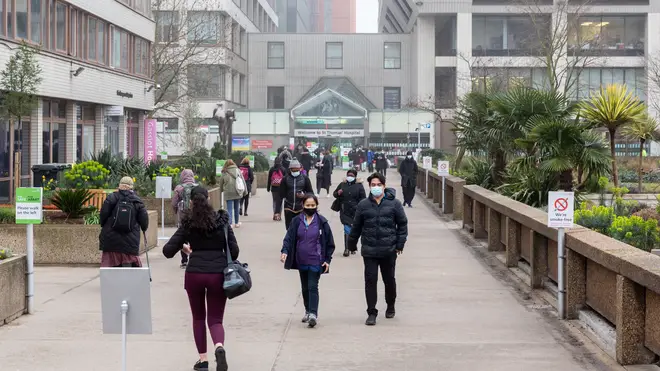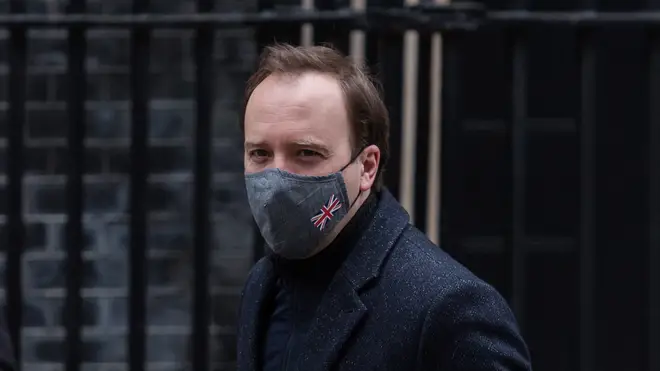
James O'Brien 10am - 1pm
4 March 2021, 00:02

The rate of decline in Covid-19 infections in England has slowed, figures suggest, with experts urging people to stick to lockdown rules to give the vaccination programme "the best chance of working".
One in every 213 people is still testing positive for Covid-19, the study found.
In some parts of the country the rate of decline has plateaued and in places there are hints that rates are increasing, the data suggest.
Researchers warned that if infection rates start to rise then people who are due their jab imminently may become infected.
They said infection rates need to get as low as possible to give the vaccination programme the best chance of working.
Health Secretary Matt Hancock said that there is "some cause for concern" that progress in the reduction in infections could be slowing down, and even reversing in some regions.
The study also suggested that some professions have had higher rates of infection than others during the national lockdown - including teachers and transport workers.
Read more: UK reports another 315 Covid deaths as number vaccinated nears 21 million
Read more: Rishi Sunak says cost of Covid will hit £407bn as he unveils Spring Budget

Scientists have previously said that the jobs which are "open" are likely to carry higher rates of infection during this period when other workers have been instructed to stay at home.
The Imperial College London's React study has been analysing data from swab tests taken from people across England since May last year.
To date more than 1.4 million people have provided swabs so experts can assess infection rates across the country.
The latest round of tests was conducted in February - the second month of the national lockdown - with 165,000 people taking part.
Read more: Children 'scared to leave home' due to pandemic and lockdown
Read more: Sir Keir Starmer accuses Rishi Sunak's Budget of 'papering over the cracks'

Nick Ferrari's furious rant at caller who refuses Covid jab
The study, which has been published as a pre-print, drew a number of conclusions, including:
- 689 people in the study tested positive for the virus.
- The rate of infection in the community was 0.49% - down by two-thirds from January when the rate was 1.57%.
- But when researchers compared the decline from the first half of February to the second half there was a slower rate of reduction. In the first half of February the estimated rate of infection was 0.51% and in the second half of the month the rate was 0.47%.
- Researchers noted apparent rises in London, the South East and the Midlands.
- People with a Pakistani background were found to have higher rates of infection compared to other ethnic groups.
- Healthcare, care, transport workers and education workers - including teachers - were found to have higher rates of infection than those who did not work in these professions.
- Home workers had a reduction in the odds of being infected.

'Govt absolutely did not do enough to prevent Brazil Covid strain'
Commenting on the study, Mr Hancock said: "There is some cause for concern that our hard-won progress may be slowing down, and even reversing in some regions so it is important we remain vigilant - this is on all of us.
"We have set out a cautious but irreversible approach to easing restrictions, but until we reach each milestone we must all remember the virus is still here, and still dangerous.
"Please continue to stay at home - practise hands, face, space - and get your jab when you receive your invite so we can bring down infections further."
Steven Riley, professor of infectious disease dynamics at Imperial College London, said between January and February there was a "substantial drop" in cases across all regions of the country.
But he added: "The prevalence of swab positivity in England continues to fall but the rate of decline has slowed and there are some areas where prevalence may be increasing.
"In London the rate of decline certainly appears to have stopped and there is a possible signature there that it may be going up."
On the vaccine programme, he added: "If we want the vaccination technology and rollout to give the most people the best chance then we do need to get the infection rate lower for a little bit longer.
"What we need is to keep infections really low so that people who will get offered a vaccine three or four weeks from now or six weeks from now don't get infected just before they are offered a vaccine."
Professor Paul Elliott, director of the React programme, and chair in epidemiology and public health medicine at Imperial, said: "We want to protect as many people as possible, and at the moment there are a lot of people who haven't been vaccinated, but they will get vaccinated very shortly.
"If we can just all stick together and pay attention to the lockdown rules then hopefully we can minimise the number of infections before everyone who needs and wants a vaccine gets one."